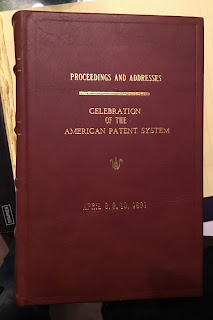In 1891, there was a massive celebration for the Centennial anniversary of the US Patent Act of 1790. Lectures and speeches about the US patent system were given by all levels of knowledgeable and important men. The speeches fill 500 pages of The Proceedings. The copy pictured is one of a kind; I purchased the loose, untrimmed pages, many years ago and had it custom bound. Remarkably, I have only recently got around to reading it. I will have a lot to say about it.
One speech was "General Washington As An Inventor And Promoter Of The Useful Arts - An Address Delivered At Mount Vernon, April 10. 1891, By J. M. Toner, M. D., On The Occasion Of The Visit Of The Officers And Members Of The Patent Centennial Celebration". Over 600 important persons traveled by boat down the Potomac to Mount Vernon to hear Dr. Toner's speech.
Dr. Toner says:
It is not certain who introduced the proposition [at the Constitutional Convention of 1787] regarding Patents and Copyrights; but, considering the personnel of the convention, it might have originated with either Washington or Franklin, and was certain of an earnest support from both.Proceedings, p. 316.
While it is true that it is not certain who introduced the patent clause to the Constitutional Convention, it is certain that it was not either of Washington or Franklin. Dr. Toner's mistake is not his alone; apparently others have made this claim. However, as Edward Walterscheid, a noted US patent law historian says:
The contention that a provision for copyrights and patents was "urged by no one less than Washington" in the context of the Constitutional Convention is simply wrong.See Edward C. Walterscheid, To Promote the Progress of Science and Useful Arts:the Background and Origin of the Intellectual Property Clause of the United States Constitution, 2 J. Intell. Prop. L. 1, 41 (1994) (citations omitted).
If there is any uncertainty, the uncertainty lies with whether it was James Madison or Charles Pinkney, both of these two men, or Pinkney alone, and what was the language actually introduced. See id, 45-51 (1994). Adding to the confusion are conflicting writings of Madison, See id, and Pinkney's controversial role at the Convention, where claimed to have been the most influential delegate.
Bruce Bigbee's classic history of the US patent system adds to the confusion, saying:
David Brearley of New Jersey arose and presented to the assembly five suggested amendments concerning the powers of the future Congress.
The first four enlarged, restricted, or otherwise modified powers already contemplated in the emerging draft of the Constitution. The fifth proposal contemplated the creation of an entirely new Federal power protecting the works of authors and inventors.Bruce W. Bigbee, Genesis of American Patent and Copyright Law (1967), p. 127.
As Dr. Toner is a noted historian and student of Washington, I try to give Dr. Toner's mistaken speech the benefit of the doubt. However, doing so is difficult. Walterscheid's conclusions do not reflect some modern or revisionist interpretation. For example, the Madison/Pinkney connection was described in the very first speech of the Centennial, "Birth And Growth Of The American Patent System", By Hon. Charles Eliot Mitchell, Commissioner Of Patents. Proceedings, p. 47.
How Dr. Toner could make such a major blunder in front of such a group of knowledgeable persons is inexplicable.
**

No comments:
Post a Comment